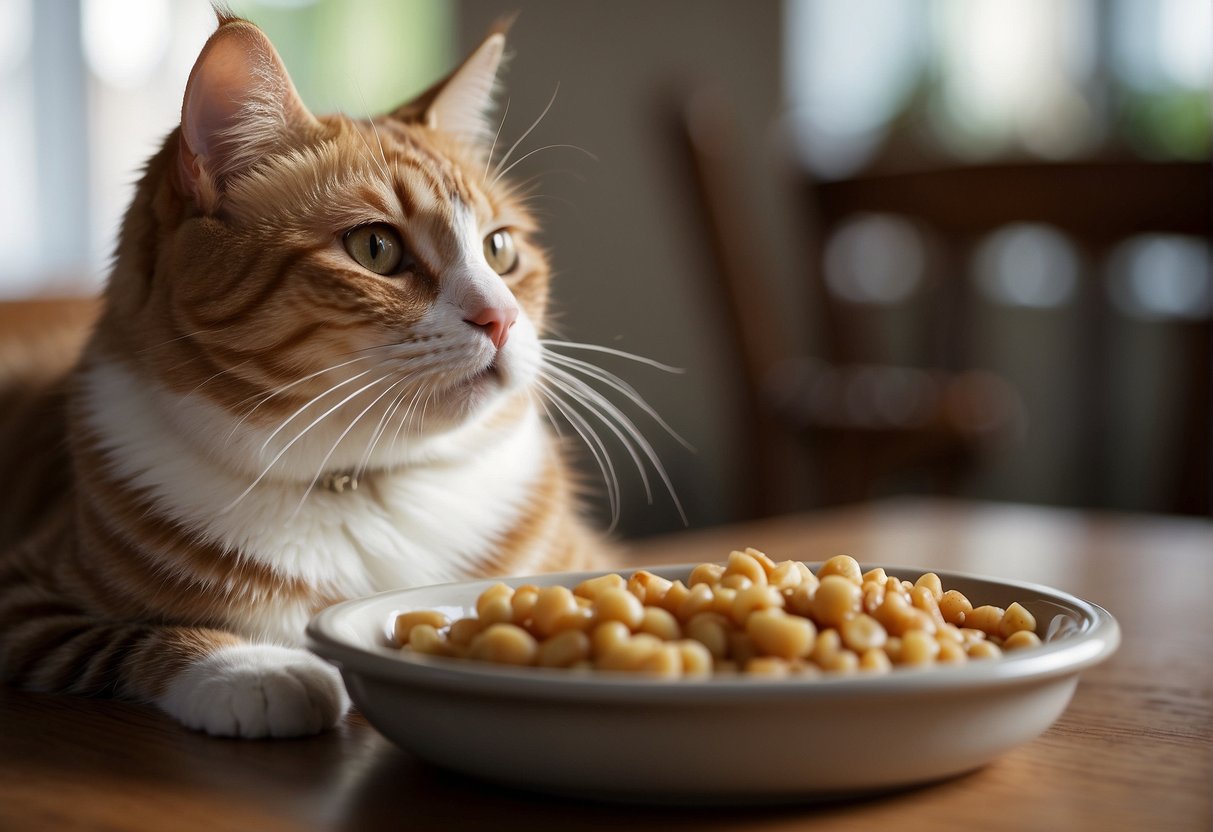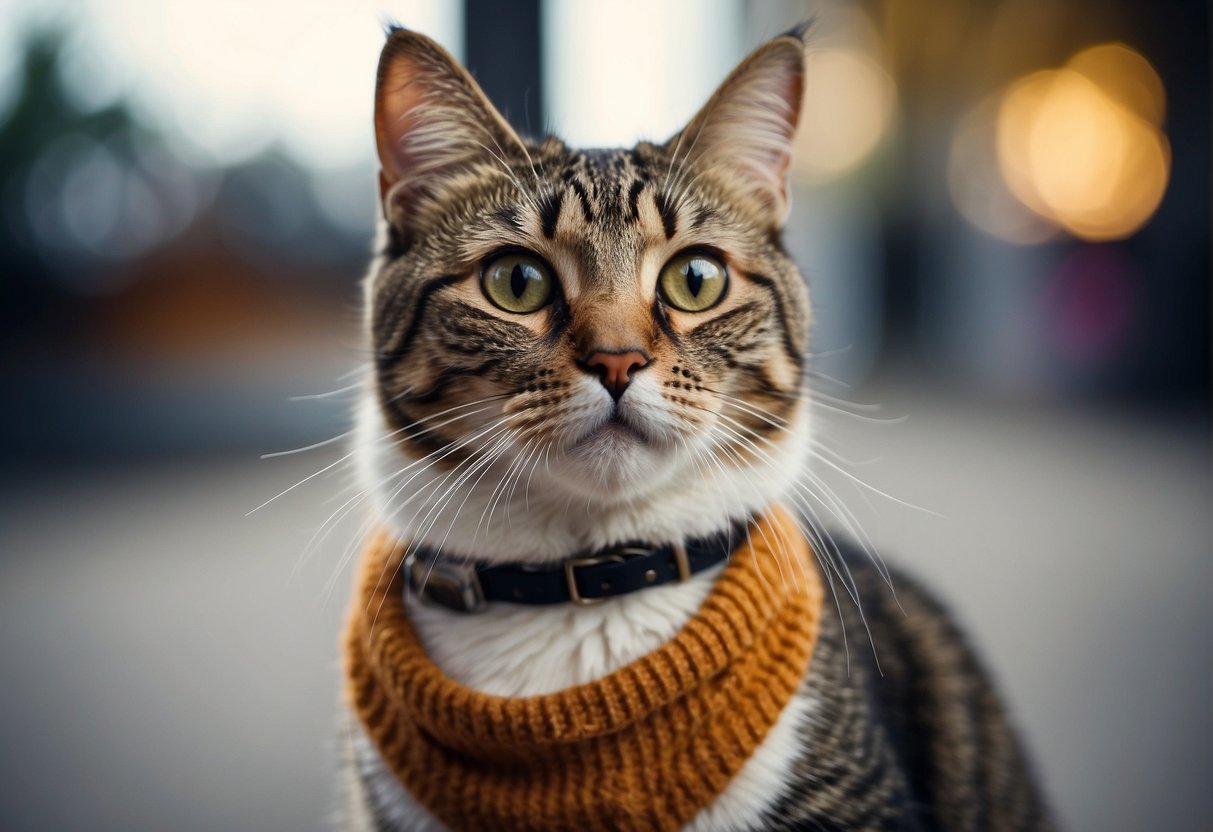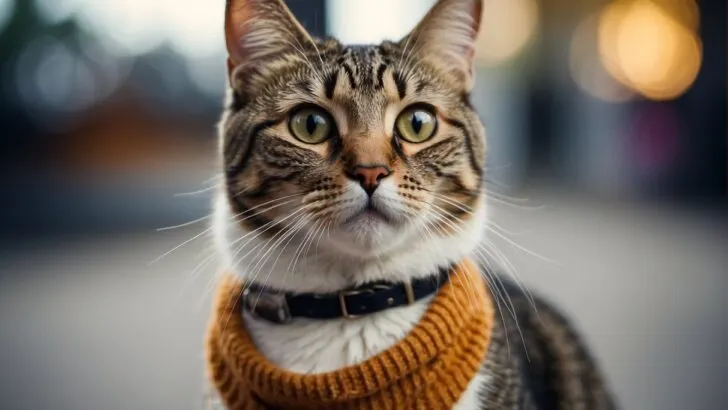If you’re noticing a gurgling sound coming from your cat’s stomach, it’s often a normal part of digestion. Just like us, as food moves through the gastrointestinal tract, it stirs up the liquid and gas inside, which can create a range of noises.
When my own cat prowls around the house after mealtime, I sometimes hear these telltale gurgles, a sign that everything is churning along as it should.

However, there are times when the gurgling could indicate your furry friend has an upset stomach. Perhaps they snatched a bite of human food that didn’t sit well, or they’re adjusting to a new brand of cat food. An occasional upset stomach isn’t uncommon and can result in some noisy belly protests.
Keep an eye on your cat’s behavior along with the gurgling. If they’re acting like their usual, playful selves, there’s likely no cause for concern. But if you notice changes like lethargy, a decrease in appetite, or other symptoms accompanying their symphony of stomach sounds, it might be time to check in with your vet.
Cat Stomach Gurgling Explained

If you’ve ever noticed a symphony of rumbles from your cat’s belly, you’re catching a glimpse into the complex world of feline digestion.
Causes of Gurgling Noises
Borborygmi, the technical term for the gurgling noises produced by your cat’s stomach, is typically a regular part of digestion. Here’s an itemized rundown of potential causes:
- Normal Digestion: As food, liquids, and gases pass through the gastrointestinal (GI) tract, they mix and create gurgling sounds.
- Hunger: When your cat’s stomach is empty, the sounds may be louder due to the lack of content to muffle them.
- Dietary Indiscretion: If your cat eats something they shouldn’t, it can lead to increased gurgling as their stomach tries to handle the unusual item.
- Digestive Issues: Conditions like inflammation or infections in the gut can lead to abnormal gurgling.
- Gut Flora Imbalance: Beneficial bacteria in your cat’s gut aid digestion; a disturbance in this delicate ecosystem could be audible.
The Gastrointestinal Tract Explained
To understand the sounds, you need to know how the gastrointestinal tract functions:
- Mouth to Stomach: Digestion begins as your cat chews their food, mixing it with saliva.
- Stomach’s Role: Food then moves to the stomach, where acids and enzymes break it down.
- Intestines at Work: Nutrient absorption mostly happens in the intestines, which is also where a significant amount of gurgling occurs due to the movement of gas and fluids.
If your cat’s belly is making noises, it’s often just a sign they are processing their last meal. However, persistent or distressing sounds can indicate something’s not quite right, and a vet visit is a good idea to rule out any serious GI issues.
Common Health Concerns
When your cat’s stomach is making noises, it’s easy to be concerned. Below, we’ll explore common digestive issues and more serious health conditions that might be at play.
Recognizing Digestive Problems
Hairballs: It’s common for cats to develop hairballs, which can cause stomach gurgling as they pass through the digestive system.
- Indigestion: Much like people, cats can experience indigestion, leading to stomach noises or discomfort.
- Constipation: A low rumble in your cat’s belly might be a sign of constipation, especially if they’re straining or going less frequently.
- Inflammatory Bowel Disease (IBD): Chronic conditions like IBD can cause stomach sounds, often accompanied by vomiting or diarrhea.
Identifying Serious Health Issues
Infections: Bacterial or viral infections might be the culprit behind your cat’s stomach distress, usually indicated by additional symptoms like lethargy or fever.
- Parasites: Worms or other parasites can disrupt your cat’s digestive system, signified by gurgling sounds along with potential weight loss or changes in appetite.
- Pancreatitis: Inflammation of the pancreas may cause gurgling and is often associated with pain or decreased appetite.
- Foreign Bodies: If your cat swallows an object they shouldn’t, it can lead to blockages, noticeable by persistent gurgling and signs of distress.
- Thyroid Disease: Hyperthyroidism can speed up digestion, possibly resulting in unusual stomach noises.
- Cancer: Though less common, cancers affecting the digestive tract can manifest as stomach gurgling and should be considered, especially in older cats.
Diet and Nutrition
When considering your cat’s stomach gurgles, examining their diet and nutrition can enlighten you about potential causes and solutions. Understanding their eating habits and the type of food they consume plays a crucial role in their digestive health.
Feeding and Eating Habits
Your cat’s eating pattern can influence their stomach health. Overeating is a common issue, where cats might ingest more food than their stomach can comfortably handle, leading to discomfort and noise.
On the flip side, dietary indiscretions, such as scavenging or sudden dietary changes, can upset their usual rhythm and cause gurgling. To promote digestive health, try offering smaller, more frequent meals and maintain consistency in what you’re serving.
- Consistent Meal Times: Establish regular feeding times to help regulate digestion.
- Portion Control: Pay attention to the recommended serving sizes to prevent overeating.
- Ensure fresh water is available at all times to aid in the digestion of food.
Special Diets for Sensitive Stomachs
Cats with sensitive stomachs may benefit from therapeutic gastrointestinal foods formulated to ease digestion and reduce irritation. These special diets often include probiotics and prebiotics that contribute to a healthy gut flora, enhancing overall gut health.
- Probiotics: Good bacteria that can be added to your cat’s diet through supplements or specialized food.
- Food Sensitivities: Be alert to signs that your cat may have adverse reactions to certain proteins or ingredients like lactose, which many adult cats cannot digest well.
- High-Quality Ingredients: Opt for diets with high digestibility and essential nutrients to reduce the chances of stomach upset.
Veterinary Care and Prevention
Cat stomach gurgling can sometimes be as simple as digestive noises, but it can also indicate various health issues. It’s important to know when these sounds suggest a trip to the vet and how to prevent potential problems.
When to Consult a Veterinarian
If your cat’s stomach gurgling is accompanied by weight loss, discomfort, diarrhea, dehydration, a lack of appetite, or more frequent episodes of lethargy, it’s time for a veterinary consultation.
These could be signs of more serious conditions like internal parasites, foreign body ingestion, hairballs that need intervention, or even hyperthyroidism. A physical examination can aid in early detection of gastrointestinal issues. Here are a few specific scenarios when veterinary attention is recommended:
- Abdominal Discomfort: If your cat seems in pain when their stomach is touched, it shouldn’t be ignored.
- Persistent Gastrointestinal Upset: Symptoms like ongoing diarrhea or vomiting can lead to dehydration.
- Growling Noises with Other Symptoms: While occasional growling is normal, if it’s with behavioral changes like hiding or acting lethargic, it’s concerning.
Preventative Measures
To prevent cat stomach gurgling from leading to more serious conditions, consider the following:
- Healthy Diet: Keep your feline companion on a well-balanced diet suitable for their age and medical condition. Regular meals prevent hunger pangs and excessive gurgling.
- Fresh Water: Ensure a constant supply of fresh water to support a healthy digestive system.
- Regular Deworming: Treat your cat for internal parasites like tapeworms as per veterinary guidance to avoid gastrointestinal upset.
Hairball Remedies: Regular grooming and hairball remedies can help to reduce the chances of hairball-related stomach gurgling.

My name is James, and welcome to FAQCats!
Along with our team of cat owners, expert pet enthusiasts, and pet professionals, we aim to write engaging helpful, engaging content about cats. At FAQCats we strive to provide content that’s accurate and fun to read. Our team writes about everything related to cats; even the most complex of topics. Through extensive research and caring for our own fur-pals, we’re able to provide something cat owners worldwide will love. Have a look around, and leave us feedback anytime!

